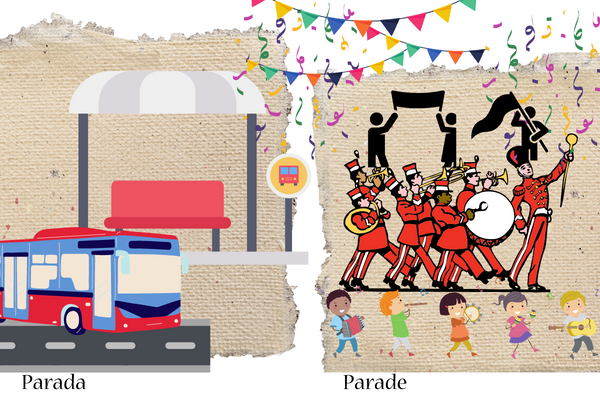False Cognates - Nouns
In our previous blog, we shared 10 of the most common Spanish language false cognate verbs (verbs that look like English words but have different meanings), e.g. pretender (to try to do something) ≠ pretend. There are many false cognates in Spanish, and in this blog we are happy to share 12 common noun false cognates.
False cognates are words that are spelled almost the same in Spanish and English, yet the meanings are completely different. You have probably used a false cognate in Spanish if you’ve experienced a look and chuckle where one wasn’t expected! We’re here to teach you some of these false cognates so you can feel proud of yourself for knowing the differences. Do not fret, we have all experienced a mix-up between words in English and in Spanish and know that making these mistakes actually helps us to remember to use the correct word in the future.
One incredible (increíble) thing about Spanish is that there are hundreds of words that do translate from Spanish to English by simply adding a Spanish accent and possibly an ‘o’ or ‘a’ at the end and others which are spelled exactly the same and the only difference is the pronunciation (pronunciación). For example, the English word ‘different’ sounds and looks quite similar to the Spanish word ‘diferente’ so if you make that guess, you’ve just added a new word to your Spanish vocabulary! That is because both mean the same thing making these two words ‘near perfect cognates’. Both have the same meanings but are distinguishable due to the Spanish word lacking one letter ‘f’ and having an ‘e’ at the end. ‘Perfect cognates’ on the other hand are words that are spelled the same in English and Spanish. For example the words ‘piano’ and ‘radio’ are spelled the same in Spanish and English and have the same meanings but are simply pronounced differently.
False cognates, however, can become challenging to decipher as we cannot guess their meanings. The best way to learn these false cognates is by practicing and studying. Once you learn these false cognates, you will be in a better position to catch yourself before misusing a Spanish word that looks like an English word. If you do use the word incorrectly, you’ll probably know soon enough as the conversation might take an interesting, unexpected twist.
Below are 12 common false noun cognates:
Ropa ≠ Rope
Ropa /ro pah/= Clothes
Después de lavar la ropa mi hermana la dobla.
After washing the clothes my sister folds them.
Fábrica ≠ Fabric
Fábrica /fáh bree kah/ = Factory
Mi tío solía trabajar en la fábrica de zapatos en Zacatecas.
My uncle used to work in the shoe factory in Zacatecas.
Diario ≠ Diary
Diario /dee ár ee oh/ = Newspaper, or every day
Diario salgo a comer, usualmente a las dos de la tarde.
Every day I go out to eat, usually at two in the afternoon.
Rosie lee el diario cada fin de semana.
Rosie reads the newspaper every weekend.
Pan ≠ Pan (cooking)
Pan /pahn/ = bread
¿Cuánto cuesta el pan dulce?
How much does the sweet bread cost?
Pasta ≠ Pasta
Pasta /pah stah/ = Paste or toothpaste
¡Mamá! Ya no tenemos pasta de dientes.
Mom! We don’t have any toothpaste!
Vaso ≠ Vase
Vaso /bah soh/ = glass
¿Quieres un vaso de agua?
Would you like a glass of water?
Tabla ≠ Table
Tabla /tah blah/ = board (usually wooden)
Necesitamos 3 tablas para construir el librero.
We need 3 boards to build the bookshelf.
Parada ≠ Parade
Parada /pah rah dah/ = Bus stop
Tenemos que esperar en la parada de autobuses.
We have to wait at the bus stop.
Pie ≠ Pie
Pie /pee eh/ = Foot
¡Mi pie me duele!
My foot hurts!
Sopa ≠ Soap
Sopa /soh pah/ = Soup
Me encanta la sopa de alfabeto que hace mi mamá.
I love the alphabet soup that my mother makes.
Chico(a) ≠ Chick
Chico/Chica /chee koh/ /chee kah/ = adolescent boy or girl
La chica pidió un helado de mamey y el chico pidió un helado de fresas con crema.
The girl asked for mamey ice cream and the boy asked for strawberries and cream ice cream.
Policía ≠ Policy
Policia /poh lee see ah/ = Police
Cuando hay un accidente la policía llega al lugar.
When there is an accident the police arrive at the place of the occurrence.
Now that you have learned twelve new false cognate nouns, we encourage you to get out there and practice them! As always, we feel that assuming a word is a cognate rather than a false cognate is the best way to dive into your Spanish practice as you will be happily surprised by the English and Spanish similarities. If you want tor} read more about False Cognates, check out our previous blog about Verbs.
Check out our other blogs for more grammar and language tips. If you are ready to go more deeply into your Spanish learning, contact us or send over an email at say@naatikmexico.org. We’ll be happy to set you up with an immersion or online language package that’s perfect for you.



